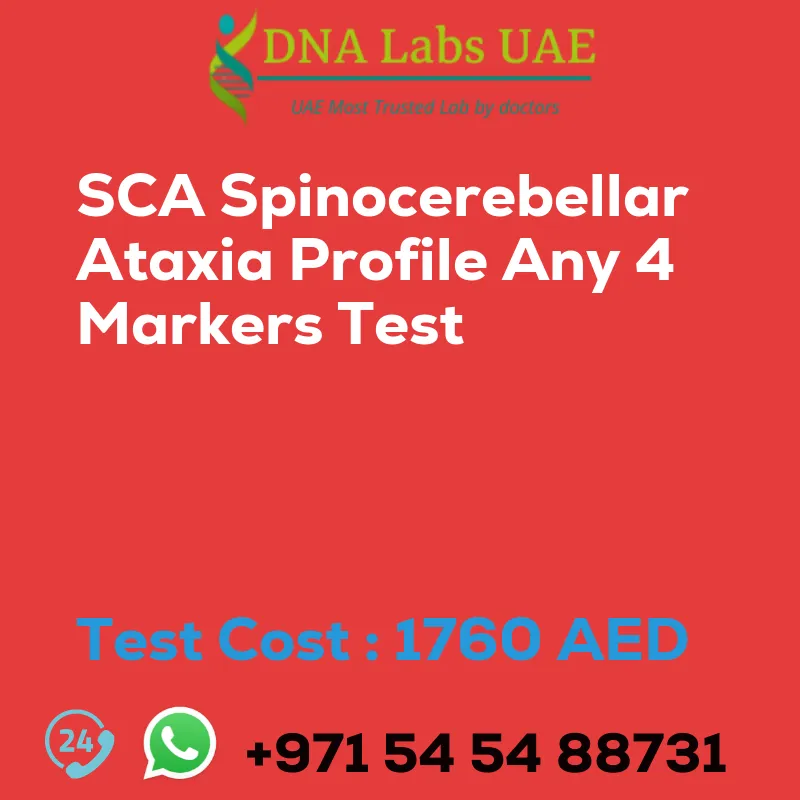SCA Spinocerebellar Ataxia Profile – Any 4 Markers
Test Cost: AED 1760.0
Test Components:
- ATXN1
- ATXN2
- ATXN3
- CACNA1A
- ATXN7
- PPP2R2B
Sample Condition:
4 mL (2 mL min.) whole blood in 1 Lavender top (EDTA) tube. Ship refrigerated. DO NOT FREEZE. Duly filled Genomics Clinical Information Requisition Form (Form 20) is mandatory.
Report Delivery:
Sample due by Tuesday 11 am; Report delivered on Saturday
Method:
PCR, Fragment Analysis
Test Type:
Neurologic Disorder-Ataxia
Doctor:
Neurologist
Test Department:
Molecular Diagnostics
Pre Test Information:
Duly filled Genomics Clinical Information Requisition Form (Form 20) is mandatory.
Test Details:
There are several different types of spinocerebellar ataxia (SCA), each with its own set of markers or symptoms. Here are four common markers that may be tested for in a SCA profile:
- Gait abnormalities: SCA often causes problems with coordination and balance, leading to an unsteady or uncoordinated gait. This can be tested by observing the individual’s walking pattern or using specialized gait analysis equipment.
- Dysarthria: Dysarthria refers to difficulties with speech and articulation. Individuals with SCA may have slurred speech, difficulty pronouncing words, or a monotone voice. This can be assessed through a speech evaluation or by listening to the person’s speech patterns.
- Nystagmus: Nystagmus is a rapid, involuntary movement of the eyes that can occur in SCA. It is often characterized by rhythmic, back-and-forth eye movements. This can be observed during an eye examination or by tracking the person’s eye movements.
- Hand dexterity and fine motor skills: SCA can affect the coordination and fine motor skills of the hands, making tasks such as writing, buttoning clothes, or using utensils difficult. This can be assessed through various tests, such as finger tapping or manipulating objects with the hands.
It’s important to note that these markers may vary depending on the specific type of SCA being tested for, as there are multiple subtypes with different clinical presentations. Additionally, genetic testing may also be done to identify specific genetic mutations associated with SCA.
| Test Name | SCA SPINOCEREBELLAR ATAXIA PROFILE ANY 4 MARKERS Test |
|---|---|
| Components | Select any 4 markers: *ATXN1 *ATXN2*ATXN3*CACNA1A *ATXN7 *PPP2R2B |
| Price | 1760.0 AED |
| Sample Condition | 4 mL (2 mL min.) whole blood in 1 Lavender top (EDTA) tube. Ship refrigerated. DO NOT FREEZE. Duly filled Genomics Clinical Information Requisition Form (Form 20) is mandatory. |
| Report Delivery | Sample Tue by 11 am; Report Sat |
| Method | PCR, Fragment Analysis |
| Test type | Neurologic Disorder-Ataxia |
| Doctor | Neurologist |
| Test Department: | MOLECULAR DIAGNOSTICS |
| Pre Test Information | Duly filled Genomics Clinical Information Requisition Form (Form 20) is mandatory. |
| Test Details | There are several different types of spinocerebellar ataxia (SCA), each with its own set of markers or symptoms. Here are four common markers that may be tested for in a SCA profile: 1. Gait abnormalities: SCA often causes problems with coordination and balance, leading to an unsteady or uncoordinated gait. This can be tested by observing the individual’s walking pattern or using specialized gait analysis equipment. 2. Dysarthria: Dysarthria refers to difficulties with speech and articulation. Individuals with SCA may have slurred speech, difficulty pronouncing words, or a monotone voice. This can be assessed through a speech evaluation or by listening to the person’s speech patterns. 3. Nystagmus: Nystagmus is a rapid, involuntary movement of the eyes that can occur in SCA. It is often characterized by rhythmic, back-and-forth eye movements. This can be observed during an eye examination or by tracking the person’s eye movements. 4. Hand dexterity and fine motor skills: SCA can affect the coordination and fine motor skills of the hands, making tasks such as writing, buttoning clothes, or using utensils difficult. This can be assessed through various tests, such as finger tapping or manipulating objects with the hands. It’s important to note that these markers may vary depending on the specific type of SCA being tested for, as there are multiple subtypes with different clinical presentations. Additionally, genetic testing may also be done to identify specific genetic mutations associated with SCA. |







